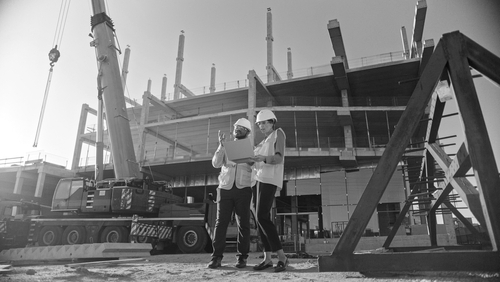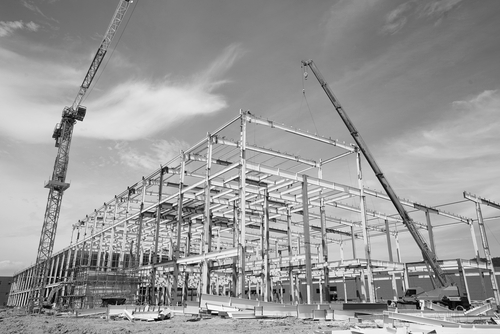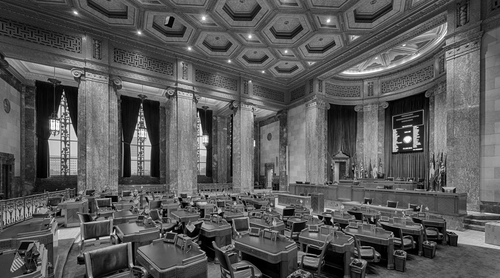By: Vijnata Trivedi, J.D., Regulatory Counsel | November 5, 2021
Right now, you have a valuable opportunity to be involved in the upcoming state and local code revision process. The International Code Council (ICC) officially published the 2021 edition of its model building codes. Many states and jurisdictions across the country are planning to adopt or upgrade building codes and standards.
Before you begin drafting proposals and reaching out to key decision-makers, you must ensure you've crafted the right strategy to make the difference you want to see.
To help guide you, Regulatory Counsel Vijnata Trivedi, J.D. shares her perspective on how you can more effectively participate and reach your goals in the building code development and adoption process by state.

Which states are updating their building codes?
Here are some examples of the state governments currently undergoing a building code revision process:
- California: The California Building Standards Commission is working on its 2021 Triennial Code Adoption Cycle. It plans to adopt 2020 I-Codes and the 2020 National Electrical Code (NEC.) The target effective date is January 1, 2023.
- Connecticut: Connecticut restarted its building code revision process in 2021. Connecticut previously considered the 2018 I-Codes, but the process was delayed in response to the COVID-19 pandemic. It plans to adopt 2021 I-Codes and the 2020 NEC. The Codes Amendment Subcommittee of the Codes and Standards Committee is reviewing the model codes.
- Florida: The Florida Building Commission began the triennial building code update process in 2021. It plans to adopt 2021 I-Codes and the 2020 NEC. The target effective date is December 31, 2023.
- Louisiana: The Louisiana State Uniform Construction Code Council began the building code update process in 2021. It plans to adopt 2021 I-Codes and the 2020 NEC. The target effective date is January 1, 2023.
- South Carolina: The South Carolina Building Codes Council began the building code revision process in 2021. It plans to adopt 2021 I-Codes and the 2020 NEC.

Which 2021 model I-Codes are being reviewed
Several states are reviewing the following model codes:
- The International Building Code (IBC) - The IBC addresses buildings' health and safety concerns based upon prescriptive and performance-related requirements. The 2021 IBC contains many significant changes, such as puzzle or escape rooms are now defined and regulated as particular amusement areas, requiring compliance with Section 411 and unique means of egress requirements.
- The International Energy Conservation Code (IECC) - The IECC addresses energy efficiency on several fronts, including cost, energy usage, use of natural resources, and the impact of energy usage on the environment.
- The International Existing Building Code (IEBC) - The IEBC encourages the use and reuse of existing buildings. The code covers repair, alteration, addition, and change of occupancy for existing and historic buildings while achieving appropriate levels of safety without requiring full compliance with the new construction requirements contained in the other I-Codes. The 2021 IEBC has many significant changes. Storm shelters are now needed to be limited to the total occupant load of classrooms, vocational rooms, and offices in schools while the maximum travel distance is deleted.
- The International Fire Code (IFC) - The IFC was created to satisfy model code regulations for an up-to-date fire code addressing conditions hazardous to life and property from fire, explosion, and the handling or use of dangerous materials. The comprehensive fire code establishes minimum regulations for fire prevention and fire protection systems that safeguard public health and safety.
- The International Fuel Gas Code (IFGC) - The IFGC addresses the design and installation of fuel gas systems and gas fire appliances through prescriptive and performance requirements. The 2021 IFGC contains many significant changes, such as the termination of concealed condensate piping must now require a marking to indicate if it is a primary drain or secondary.
- The International Mechanical Code (IMC) - The IMC establishes minimum regulations for mechanical systems using prescriptive and performance-related provisions. The IMC developed broad-based principles that make the use of new materials, methods, and design possible. The 2021 IMC contains many significant changes, such as clothes dryer exhaust terminals are now required to be at least 3 feet from any opening into a building.
- The International Residential Code (IRC) - The IRC is a comprehensive model code comprising all building, plumbing, mechanical, fuel gas, and electrical requirements for one- and two-family dwellings and townhouses up to three stories. The 2021 IRC contains many significant changes: braced walls must now be placed on a physical wall or between multiple walls.
It's important to note that some states will adopt some or all these codes, while others will adopt them with state-specific amendments.
What is each state's timeline for reviewing and adopting I-Codes?
Each state has its own timeline for the building code adoption process, which is determined by the legislature, government agency, building code board, or building code commission. Many states require the I-Codes to be reviewed as newer editions are issued. For example, Florida requires its building code commission to adopt an updated building code every three years. During the process, Florida's building code commission must review the most current editions of I-Codes. Maryland requires the government agency to adopt a newer edition of the IBC within 18 months after it is issued.

Is code adoption occurring through state regulatory agencies or state legislatures?
State code adoption occurs through either legislative or regulatory agency actions.
Legislative action is through the state legislature. Bills are introduced and passed through the appropriate committees. These committees may make modifications and recommendations on the bills. The legislative process also allows for input from and collaboration with a wide array of outside and non-technical groups. New code policies need to fit within specific timeframes and compete with other state priorities.
Regulatory action refers to when agencies of the executive branch of government, building code boards, or building code commissions are tasked to review and adopt building codes. When adoption occurs through this process, states often appoint advisory groups of industry stakeholders, including individuals from the design, construction, and enforcement communities. These groups review model code requirements and consider the impacts of their provisions. They make recommendations that proceed through a public review process.
Most states, such as California, Connecticut, and Florida use a regulatory process to update building codes and standards. Some states such as Utah and South Dakota use a legislative process.
Gain the Perspective You Need
The regulation of the built environment is a unique experience in the United States, and there may be more going on than you may realize. Nonetheless, the challenges facing advocates in the building sector are not unlike those in other areas of regulation. Effectively reaching your goals will require that you have the proper perspective in your corner to craft a strategy that wins.
At Stateside, we actively monitor legislative and regulatory actions related to building code adoption at the state and local levels across all 50 states. We also have many relationships on both sides of the aisles to help you identify key players who share your goals.
Meet Vijnata Trivedi, J.D., Regulatory Counsel
 Vijnata Trivedi, J.D., is a Regulatory Counsel in the Regulatory Services Division. With a background in comparative government and politics, Vijnata brings a global perspective along with in-depth local knowledge. She previously held positions at a global legal consulting firm, where she worked on legal and compliance matters for clients in the healthcare industry and energy sector, and at a boutique international law firm, where she provided strategic guidance on international laws and regulations to global companies, investors, and entrepreneurs. Complete bio here.
Vijnata Trivedi, J.D., is a Regulatory Counsel in the Regulatory Services Division. With a background in comparative government and politics, Vijnata brings a global perspective along with in-depth local knowledge. She previously held positions at a global legal consulting firm, where she worked on legal and compliance matters for clients in the healthcare industry and energy sector, and at a boutique international law firm, where she provided strategic guidance on international laws and regulations to global companies, investors, and entrepreneurs. Complete bio here.
Discover how you can more effectively participate and reach your code development and adoption process goals with the Stateside perspective. Learn more today.
